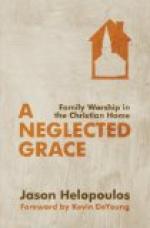As true, mutual love is the basis of marriage, so also should it be a standard of our judgment in the marriage choice. Without it, neither beauty, wealth, nor rank will make home happy. True love should be such as is upheld in scripture. It is above mere passion. It never faileth. It is life-like and never dies out. It is an evergreen in the bosom of home. It has moral stamina, is regulated by moral law, has a moral end, contains moral principle, and rises superior to mere prudential considerations. It is more than mere feeling or emotion; it is not blind, but rational, and above deception, having its ground in our moral and religious nature. It extends to the whole person, to body, mind, and spirit, to the character as well as to the face and form. It is tempered with respect, yea, vitalized, purified, directed and elevated by true piety. Such love alone will survive the charms and allurements of novelty, the fascinations of sense, the ravages of disease and time, and will receive the sanction of heaven.
Mutual adaption of character and position is another scripture standard of judgment. Is that person suited for me? Will that character make my home happy? Could I be happy with such an one? Are we congenial in spirit, sentiment, principle, cultivation, education, morals and religion? Can we sympathize and work harmoniously together in mind and heart and will and taste? Are we complemental to each other? These are questions of far greater importance than the question of wealth, of beauty, or of rank.
Fitness of circumstances, means, and age should be also considered. Am I able to support a family? Can I discharge the duties of a household? Where there is ignorance of household duties, indolence, the want of any visible means of supporting a family, no trade, no education, no energy, and no prospects, there is no reason to think there can be a proper marriage. Thus, then, mutual love, adaptation of character, of means, of circumstances, of position, and of age, should be considered, in the formation of a marriage alliance.
But the standard of judgment to which the scriptures especially direct our attention is, that of religions equality, or spiritual adaptation. “Be not unequally yoked together with unbelievers.” The positive command here is, that Christians should marry only in the Lord. Here is a test in the selection of a companion for life, from which neither parents nor children should ever depart. It evidently forbids a matrimonial union with those who have no sympathy with religion. We should make more account of religious equality than of equality of rank and wealth. Is not true piety of more importance than education, affluence or social distinction? When husband and wife are unequally yoked together in soul and grace, their home must suffer spiritually as well as temporally. The performance of religious duties and the enjoyment of religious privileges, will be impossible. The unbeliever will discourage,




